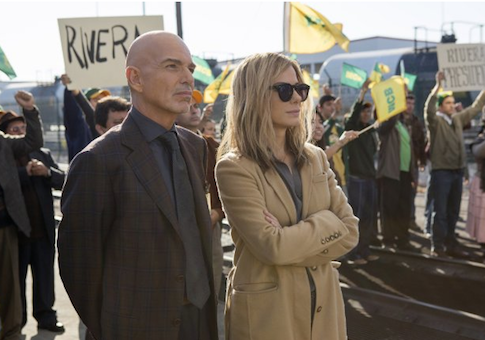When did international bankers become the go-to bad guys on the big screen?
Earlier this year we saw No Escape—a movie about a coup in an unnamed Asian nation in which an American family must stay ten steps ahead of a rampaging mob of murderous natives—attempt to shift the blame away from the savage revolutionaries and onto international banks that saddle native industries with debt before taking over the infrastructure outright, leaving native workers penniless.
Now we have Our Brand Is Crisis, a film in which a cynical American political hack ("Calamity" Jane, played by the always-delightful Sandra Bullock) attempts to influence an election in Bolivia and is distraught to discover that the guy she fought so hard for is going to sell out the nation to the dread International Monetary Fund.
But I’m getting ahead of myself. Before it devolves into treacly preaching about the evils of international finance and the corrosiveness of cynicism—politicians should, like, help people man! They should stand for something!—Our Brand Is Crisis is actually a relatively amusing look at the ways in which political consultants manipulate voters, the media, and each other in an effort to get their horse over the finish line first.
Jane, who has fled D.C. and gone into pseudo-retirement after a string of tough losses, is brought on board by Nell (Ann Dowd) and Ben (Anthony Mackie) to help lead former president Castillo (Joaquim de Almeida) regain whatever the Bolivian equivalent of the Oval Office is. She has a tough job on her hands, given that he’s down by double digits with just three months to go and his last tenure in office was marred by bloody riots.
Further complicating matters is the fact that Jane’s nemesis from back home, Pat Candy (Billy Bob Thornton), is helping out the opposition in Bolivia. Pat, a James Carville lookalike with a deep bag of dirty tricks to reach into, has gone up against Jane "three or four times," she says. How many times has he won?
"Three or four." She’s determined that Bolivia won’t make "four or five."
The key insight of Our Brand Is Crisis is that issues don’t really matter to voters. This isn’t a remarkably profound insight, given that it’s taken for granted most people vote for who they most want to have a beer with rather than who they agree with about legislation. Democracy doesn’t depend on disinterested discourse about dogma. It depends on getting your people to the polls or convincing the other guy’s voters to either stay at home or vote for someone who can’t win. And you don’t really do any of these things by arguing about tax rates or the rights of indigenous peoples or whatever: you do it by scaring them or inspiring them with appeals to the base’s baser emotions.
In other words, you pit "hope and change" versus "everything is going wrong."
Of course, the relentlessly cynical nature of such a life gets to Jane after she sees how disappointed one of the young Bolivian interns is with for Castillo for caving to the dread IMF—seriously, folks, the phrase "eighteen percent interest rate" is uttered in a tone so sinister you’d think that the CIA was discussing methods of bumping off recalcitrant senators—and backing out of a campaign promise. She has to rediscover herself amongst the natives, like Kevin Costner in Dances with Wolves or Sam Worthington in Avatar. She melts into the crowd, voice raised, ready to fight for what’s right and not what pays best.
Gag.
